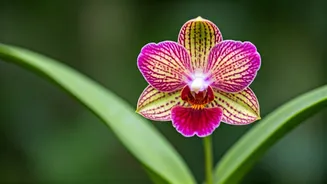Unveiling New Species
Botanists from Davangere have made a remarkable discovery, identifying three previously unknown plant species. Simultaneously, another plant species, found
for the first time in Karnataka, adds to the state's botanical records. These findings underline the state's rich biodiversity and the ongoing efforts to document it. The discovery represents a significant leap forward in understanding the flora of the region. The identification process involved careful examination and analysis of plant samples, which is a testament to the meticulous work of the botanists. These new species will undergo detailed studies to learn about their characteristics and potential uses, contributing to future conservation strategies in Karnataka. Further investigations will likely provide more detailed insights into their roles within the ecosystem.
Dharwad's Botanical Find
In a separate development, botanists from Dharwad have contributed to this wave of discovery by identifying four additional new plant species within the Western Ghats. The Western Ghats, a globally recognized biodiversity hotspot, is proving to be a treasure trove of undiscovered plant life. The findings from Dharwad highlight the importance of dedicated botanical surveys in previously unexplored or under-studied areas. Each new species adds another piece to the puzzle, improving the existing knowledge regarding the complex ecosystem. The researchers likely encountered unique challenges during the collection, identification, and documentation of these new plants. These discoveries reinforce the value of scientific exploration for environmental conservation and the importance of safeguarding these natural areas for the future.
Significance of the Finds
The discovery of these new plant species has far-reaching implications, starting with a more complete understanding of Karnataka's plant life. Each new plant provides scientists with fresh research avenues, enabling a deeper understanding of plant evolution, adaptation, and ecological relationships. The identification of previously unknown species can also lead to the discovery of potentially valuable medicinal or other properties, that were previously unknown to science. For conservation efforts, these findings help recognize areas that are rich in biodiversity. Consequently, it supports the creation of protected zones and promotes sustainable management practices to protect these plant species and their habitats. These discoveries show the urgent need for preserving natural environments to ensure the survival of all species.
Future Research Avenues
These discoveries pave the way for numerous future research opportunities. Scientists can delve into more detailed studies of the new species' genetic makeup, ecology, and reproductive strategies. Investigating how these plants interact with the other organisms in their environments will be an interesting study. Understanding their distributions and the possible threats they face will be critical for their conservation. Advanced technologies, such as DNA barcoding and remote sensing, may accelerate species discovery and enhance our understanding of biodiversity. Continued collaboration between botanists and other specialists will be crucial for the effective conservation of the newfound plant life. Such work is vital for preserving Karnataka's natural heritage and contributes to worldwide efforts to safeguard biodiversity.















